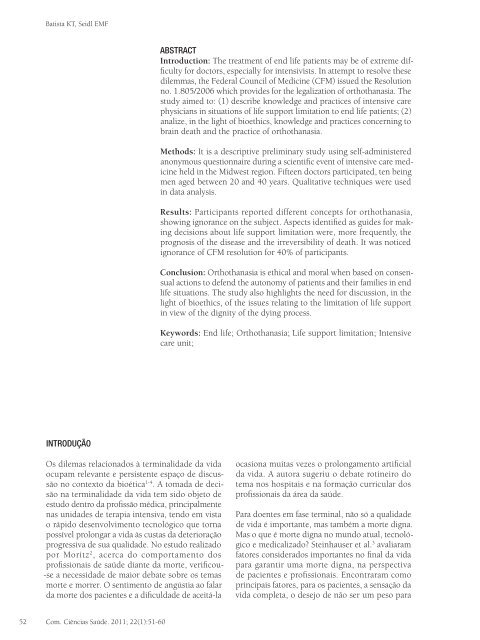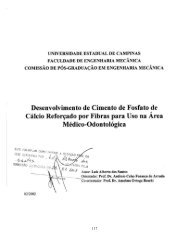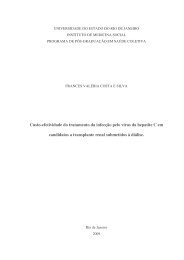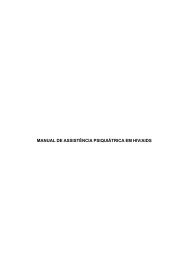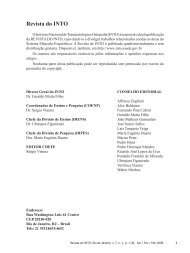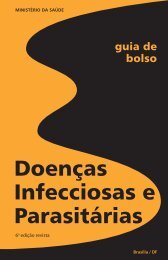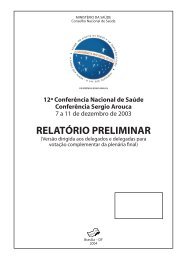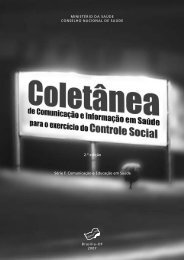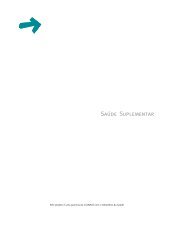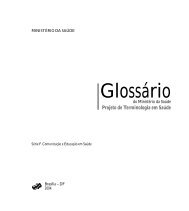Estudo acerca de decisões éticas na terminalidade da vida em ...
Estudo acerca de decisões éticas na terminalidade da vida em ...
Estudo acerca de decisões éticas na terminalidade da vida em ...
You also want an ePaper? Increase the reach of your titles
YUMPU automatically turns print PDFs into web optimized ePapers that Google loves.
Batista KT, Seidl EMF<br />
ABSTRACT<br />
Introduction: The treatment of end life patients may be of extr<strong>em</strong>e difficulty<br />
for doctors, especially for intensivists. In att<strong>em</strong>pt to resolve these<br />
dil<strong>em</strong>mas, the Fe<strong>de</strong>ral Council of Medicine (CFM) issued the Resolution<br />
no. 1.805/2006 which provi<strong>de</strong>s for the legalization of orthotha<strong>na</strong>sia. The<br />
study aimed to: (1) <strong>de</strong>scribe knowledge and practices of intensive care<br />
physicians in situations of life support limitation to end life patients; (2)<br />
a<strong>na</strong>lize, in the light of bioethics, knowledge and practices concerning to<br />
brain <strong>de</strong>ath and the practice of orthotha<strong>na</strong>sia.<br />
Methods: It is a <strong>de</strong>scriptive prelimi<strong>na</strong>ry study using self-administered<br />
anonymous question<strong>na</strong>ire during a scientific event of intensive care medicine<br />
held in the Midwest region. Fifteen doctors participated, ten being<br />
men aged between 20 and 40 years. Qualitative techniques were used<br />
in <strong>da</strong>ta a<strong>na</strong>lysis.<br />
Results: Participants reported different concepts for orthotha<strong>na</strong>sia,<br />
showing ignorance on the subject. Aspects i<strong>de</strong>ntified as gui<strong>de</strong>s for making<br />
<strong>de</strong>cisions about life support limitation were, more frequently, the<br />
prognosis of the disease and the irreversibility of <strong>de</strong>ath. It was noticed<br />
ignorance of CFM resolution for 40% of participants.<br />
Conclusion: Orthotha<strong>na</strong>sia is ethical and moral when based on consensual<br />
actions to <strong>de</strong>fend the autonomy of patients and their families in end<br />
life situations. The study also highlights the need for discussion, in the<br />
light of bioethics, of the issues relating to the limitation of life support<br />
in view of the dignity of the dying process.<br />
Keywords: End life; Orthotha<strong>na</strong>sia; Life support limitation; Intensive<br />
care unit;<br />
INTRODUÇÃO<br />
Os dil<strong>em</strong>as relacio<strong>na</strong>dos à termi<strong>na</strong>li<strong>da</strong><strong>de</strong> <strong>da</strong> vi<strong>da</strong><br />
ocupam relevante e persistente espaço <strong>de</strong> discussão<br />
no contexto <strong>da</strong> bioética 1-4 . A toma<strong>da</strong> <strong>de</strong> <strong>de</strong>cisão<br />
<strong>na</strong> termi<strong>na</strong>li<strong>da</strong><strong>de</strong> <strong>da</strong> vi<strong>da</strong> t<strong>em</strong> sido objeto <strong>de</strong><br />
estudo <strong>de</strong>ntro <strong>da</strong> profissão médica, principalmente<br />
<strong>na</strong>s uni<strong>da</strong><strong>de</strong>s <strong>de</strong> terapia intensiva, tendo <strong>em</strong> vista<br />
o rápido <strong>de</strong>senvolvimento tecnológico que tor<strong>na</strong><br />
possível prolongar a vi<strong>da</strong> às custas <strong>da</strong> <strong>de</strong>terioração<br />
progressiva <strong>de</strong> sua quali<strong>da</strong><strong>de</strong>. No estudo realizado<br />
por Moritz 2 , <strong>acerca</strong> do comportamento dos<br />
profissio<strong>na</strong>is <strong>de</strong> saú<strong>de</strong> diante <strong>da</strong> morte, verificou-<br />
-se a necessi<strong>da</strong><strong>de</strong> <strong>de</strong> maior <strong>de</strong>bate sobre os t<strong>em</strong>as<br />
morte e morrer. O sentimento <strong>de</strong> angústia ao falar<br />
<strong>da</strong> morte dos pacientes e a dificul<strong>da</strong><strong>de</strong> <strong>de</strong> aceitá-la<br />
ocasio<strong>na</strong> muitas vezes o prolongamento artificial<br />
<strong>da</strong> vi<strong>da</strong>. A autora sugeriu o <strong>de</strong>bate rotineiro do<br />
t<strong>em</strong>a nos hospitais e <strong>na</strong> formação curricular dos<br />
profissio<strong>na</strong>is <strong>da</strong> área <strong>da</strong> saú<strong>de</strong>.<br />
Para doentes <strong>em</strong> fase termi<strong>na</strong>l, não só a quali<strong>da</strong><strong>de</strong><br />
<strong>de</strong> vi<strong>da</strong> é importante, mas também a morte dig<strong>na</strong>.<br />
Mas o que é morte dig<strong>na</strong> no mundo atual, tecnológico<br />
e medicalizado? Steinhauser et al. 3 avaliaram<br />
fatores consi<strong>de</strong>rados importantes no fi<strong>na</strong>l <strong>da</strong> vi<strong>da</strong><br />
para garantir uma morte dig<strong>na</strong>, <strong>na</strong> perspectiva<br />
<strong>de</strong> pacientes e profissio<strong>na</strong>is. Encontraram como<br />
principais fatores, para os pacientes, a sensação <strong>da</strong><br />
vi<strong>da</strong> completa, o <strong>de</strong>sejo <strong>de</strong> não ser um peso para<br />
52 Com. Ciências Saú<strong>de</strong>. 2011; 22(1):51-60


